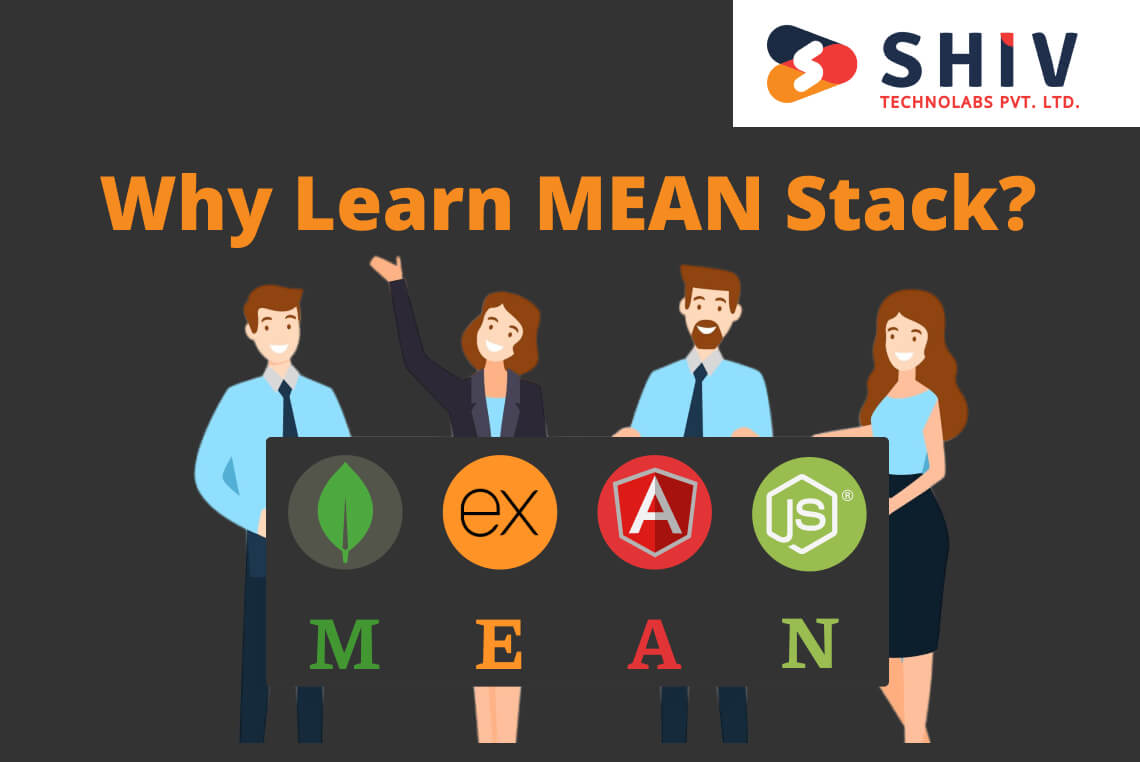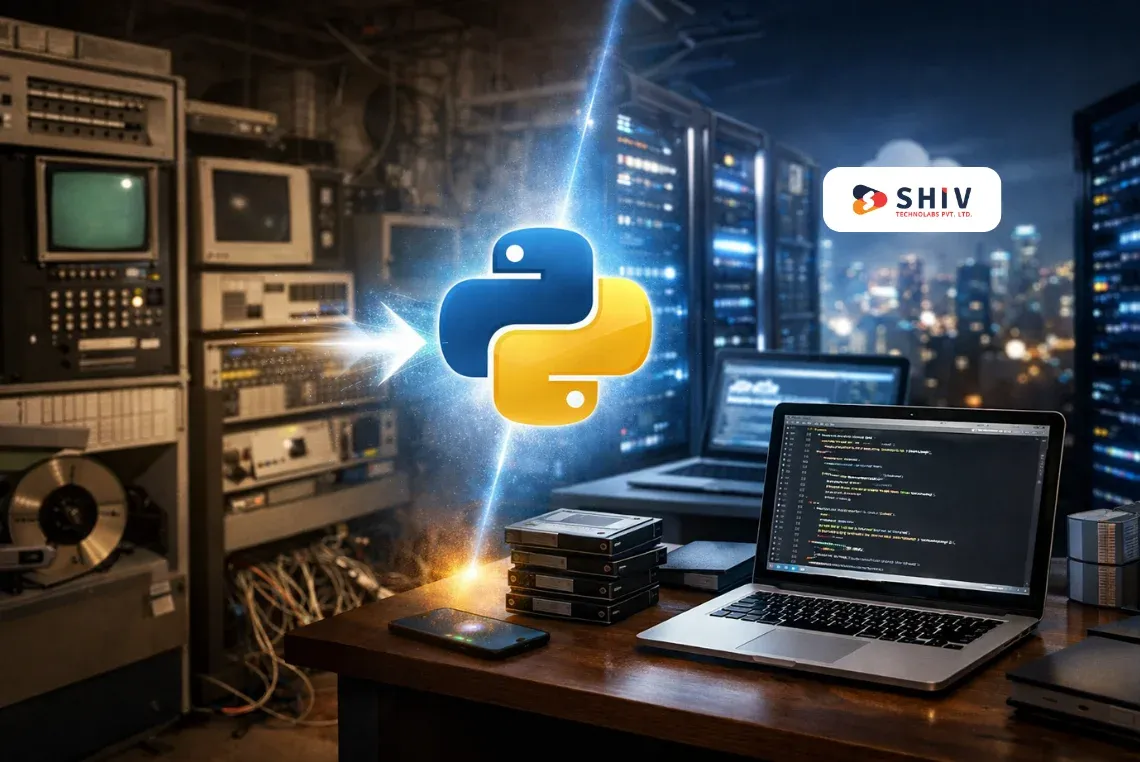Table of Contents
We are evolving our life in the digital era. Today building an application that also from the scratch you need a software stack in both standardized & consistent form.
For creating a robust backend, you need a set of tools that can reduce your development time & streamline resources as well. Today, we have several software stacks such as ROR, LAMP, & many others that have made the stack field crowded.
That is the reason why most developers prefer a combination of technologies to get better & faster results for mobile & web app development. MEAN Stack is the best example of that kind of technology.
What is MEAN?

MEAN which is an abbreviation of MongoDB, Express.js, Angular.js, and Node.js is a collection of user-friendly full-stack JavaScript frameworks. These frameworks are suitable for building dynamic applications and websites.
It’s an open-source stack for developers for a swift and organized method that builds prototypes of MEAN-based web applications.
One major advantage that MEAN stack provides is the language. JavaScript is a single language that runs on every tier of the application.
This helps in a great deal to make the approach to web & app development more efficient and modern.
# Let’s see how the MEAN stack architecture works.
- In JavaScript, AngularJS is the client-side language. So, when the client makes any request, it first gets processed by the AngularJS.
- After that, the request enters the Node.js which is phase 2. It’s also called as a server-side language.
- After phase 2 the request enters phase 3 (ExpressJS) where it requests the database.
- Once the request is made by the ExpressJS, the MongoDB retrieves all the data and returns the response to ExpressJS.
- Similarly, the ExpressJS returns the response to NodeJS which ultimately returns it to the AngularJS.
Why learn MEAN stack?

The demand for Mean Stack Development Services has grown significantly due to its flexibility in building web and mobile applications that are fast, reliable, and easy to maintain.
Since JavaScript is used across the entire MEAN stack, it provides a unified execution environment for both the server and client sides. This makes development more consistent and reduces compatibility issues.
JavaScript is essential for modern web development. It powers the MEAN stack, leading to a large and active community of developers who contribute to its continuous growth.
# Career Opportunities in MEAN Stack
One of the major reasons for adopting the MEAN stack is the increasing demand for skilled developers. Companies actively seek professionals with expertise in MongoDB, Express.js, Angular, and Node.js, as these technologies are widely used in modern applications.
# Web Development Framework: Node.js and Express.js
The combination of Node.js and Express.js in MEAN stack development provides a high-performance backend. Major corporations such as LinkedIn, Microsoft, and SAP have already adopted these technologies due to their scalability and efficiency.
Other competing backend frameworks include Ruby on Rails, Django, and Laravel. However, MEAN stack continues to gain traction due to its ability to handle high-traffic applications with ease.
Also Read: 10 Backend Frameworks for Enterprise Application Development in 2025
# Database: MongoDB
The MongoDB database is a core part of the MEAN stack. It is widely recognized for its flexibility in handling large amounts of unstructured data. Additionally, MongoDB is the default database for the Meteor.js project, further extending its usage.
Other competing databases include Cassandra, Neo4j, and Couchbase, each with its own set of advantages. However, MongoDB’s schema-less structure and JSON-based data storage make it a preferred choice for developers working on modern applications.
# Front end JavaScript Frameworks: Angular.js
The ‘A’ in MEAN Stack stands for Angular.js, a front-end framework that allows developers to build dynamic and interactive user interfaces.
Competing front-end frameworks include React.js, Ember.js, and Backbone.js. However, Angular remains one of the most widely used frameworks due to its structured approach and robust features for handling complex applications.
The MEAN stack is a complete development framework that enables developers to build scalable and efficient applications using a single programming language. Its adoption by major companies and growing job opportunities make it a valuable skill for developers. Whether for web or mobile applications, MEAN stack development continues to be a preferred choice in the industry.
What is the contribution of each component to MEAN?
# MongoDB
The role of MongoDB in the MEAN stack is to store the application’s data. Since, both the database and the application use the JavaScript, it eliminates the need for translation when the object goes from application to the database and vice-versa.
MongoDB is well-known for its scalability in both performance and storage. It’s also well-known for foolproof management of massive amounts of data.
MongoDB also facilitates you to add fields to the database without reloading the entire table.
# Express.js
Express.js forms the backend of the MEAN stack. It manages the interactions between the database and the front end. It ensures that the data is transferred smoothly to the end-user.
Express.js has a minimalist approach – it has the potential to handle all the processes efficiently. It’s important to note that the minimalistic nature doesn’t mean featureless.
Express.js also prevents you from overwriting variables. With this, you cannot accidentally redefine a variable that you have created previously. This helps in saving a great deal of time and money.
# AngularJS
AngularJS is a JavaScript front-end framework that is highly popular. In MEAN stack the Angular JS server is used to develop the user-facing side of the application.
The front end, backend, and database all are built on the JavaScript. Due to which there’s a smooth flow of data among all the parts of the application.
Angular JS is an ideal front-end framework due to its easy-to-use templates and well-tuned performance.
Moreover, you can develop an app simultaneously for both mobile and desktop.
# Node.js
In MEAN stack the Node.js acts as a backbone. Express.js is developed specifically to work on top of Node.js.
Moreover, Angular JS also connects to Node.js seamlessly to facilitate the fast data serving.
Node.js has an inbuilt web server, which makes it easier for you to deploy the MongoDB database to the cloud.
Node.js’ USP is its scalability. Moreover, it can support a million simultaneous connections.
Node.js is more compatible to work with low-resource requests as compared to resource-intensive resources.
Also Read: Top Node.Js Web Development Framework Trends For 2024
# Ease of Isomorphic Coding
A distinct advantage of using MEAN Stack Development Technology in web development is that it makes the transfer of code written in one framework to another easy.
Not only does this lead to a significant increase in productivity but it also ensures better performance as well since the data transfer among the application layers takes place in the form of JSON (JavaScript Object Notation) format.
Advantages Of Mean Stack Development Technology
# Vivid Flexibility
Developing with MEAN Stack development technologies, Hire Mean Stack Developers can test the applications of a cloud platform with ease. The flexible platform allows developers to build, test, and introduce applications in a hassle-free manner.
Further, it is easy for developers to add extra information once you have added a field to the form. The MongoDB framework allows full cluster support along with automatic replication.
# Cost-effectiveness
When compared to other technology stacks, the requirement of a total number of developers is less when it comes to MEAN Stack. Other tech stacks require developers who are well-versed in technologies like JavaScript, MySQL, and PHP.
MEAN stack is a cost-effective method of web development that relies on JavaScript proficiencies of developers only.
Thanks to a rich ecosystem and community following due to its open-source and free to use a feature, it is fairly easy for any business or development organization to adopt it.
Widespread code sharing and reuse within the MEAN stack reduce a considerable fraction of the development time thereby leading to lower overall development cost.
# High Speed & Reusability
Characteristically, development with MEAN Stack is high in speed. It is reusable due to the non-blocking architecture of Node.js. AngularJS, the open-source JavaScript framework offers MEAN Stack tech with testability, reusability, and maintenance conveniences.
The AngularJS framework stands distinctly against its counterparts and offers numerous JavaScript UI libraries with its promise of code-less browser-independence, natural blending with HTML.
This makes it fit to be adapted for application development, two-way binding, and finally, a clean separation of presentation from UI logic. Once developed libraries can be seamlessly reused for front-end as well as back-end resulting in a significant boost to productivity.
# Cloud Compatibility
MEAN Stack web development makes use of libraries and public repositories thus, reducing the overall cost of development. The use of MongoDB.js framework allows integration of cloud functionalities on the website thus reducing the disk space cost.
# Open-source Nature
Being open-source in nature, MEAN Stack technologies are frequently updated for the benefit of developers.
# Single Language Usage
When working with MEAN Stack technologies, the complete code for the development takes place in JavaScript, including both client-side to server-side development. This makes MEAN stack development easy to learn for both front end developers and backend developers.
There is no need for developers to spend time worrying about the compatibility of code between different layers. The development process becomes comparatively simpler and neater.
It in itself is easy to understand, grasp, and use during the development. As a developer, all you need to know, and master is the JavaScript (ECMA-Script) language for all the components from the presentation layer (Angular) to the database (MongoDB).
# Great User Interfaces
MEAN Stack development supports MVC (Model view controller) architecture. It thus provides quality user interfaces.
# Extensive Library
Node.js features a massive library with a variety of JavaScript modules which in turn make the process of web application development with Node.js very easy.
# JavaScript Object Notation (JSON)
JSON is omnipresent in MEAN stack development. Angular and Node.js frameworks both offer JSON. MongoDB, on the other hand, is a database framework that offers to store all the data in JSON format.
JSON is also used by the Express JS framework. The use of JSON throughout MEAN Stack development facilitates the smooth data flow without any rewriting and reformatting to the different layers.
# Ease of Debugging
As MEAN Stack features the use of a single language to work with across layers, it is easier to trace the execution thread. Developers can watch how the data gets manipulated and debug the flow with a consistent set of free open-source tools.
Summing-Up
MEAN Stack continues to evolve, making it a top choice for modern web and mobile development. Its full-stack JavaScript framework ensures efficiency, scalability, and cost-effectiveness, making it ideal for businesses seeking robust digital solutions.
Shiv Technolabs Pvt. Ltd. specializes in MEAN Stack development company, delivering custom, high-performance applications tailored to business needs. With expertise in MongoDB, Express.js, Angular.js, and Node.js, we build scalable, real-time, and feature-rich solutions that meet industry standards.
Partner with Shiv Technolabs for cutting-edge MEAN Stack solutions designed to drive growth and success.

















